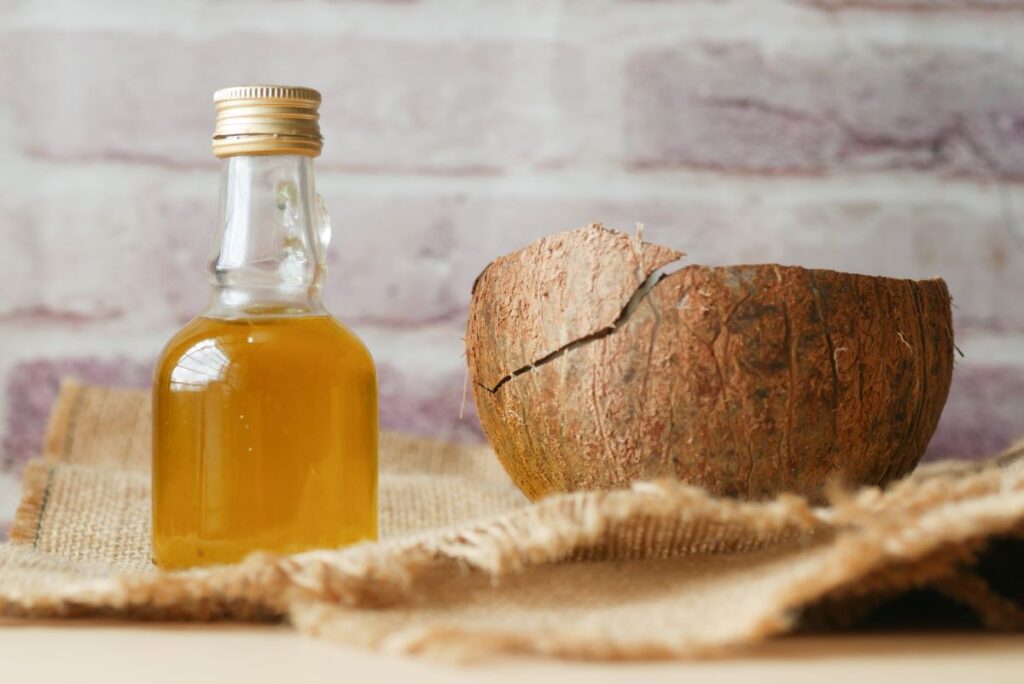Skin Care
Is Coconut Oil Comedogenic For Face
Coconut oil has long been praised as a versatile and natural beauty treatment. There seemed to be nothing coconut oil cannot accomplish, from hydrating skin and nourishing hair to removing makeup. When it comes to putting coconut oil on the face, however, there is a widespread concern that it may be comedogenic, which means it might clog pores and cause outbreaks. This article delves into the subject, “Does coconut oil comedogenic for the face?”
We hope to provide a clear response to this hot subject by evaluating scientific data and dermatological perspectives. We’ll look at coconut oil’s characteristics, its comedogenic rating, and how it affects different skin types. We’ll unpack the facts about coconut oil’s possible benefits and drawbacks for your face, whether you have dry, oily, or acne-prone skin.
So, if you’ve ever wondered if coconut oil genuinely lives up to the reputation or if it’s best avoided in the kitchen, keep reading. We have the answers you’ve been looking for.

What is comedogenicity and its relevance to skincare?
Comedogenicity refers to a substance’s ability to clog pores and produce acne or other skin problems. Skincare products and chemicals are frequently assigned a comedogenic rating based on their proclivity to clog pores. This rating system assists consumers in making informed selections regarding the skin care products they use, particularly when it comes to facial skincare.
Because oils are often used in skincare regimes, understanding their comedogenicity is critical. Different oils have varying amounts of comedogenicity, and this information can help us select the best oils for our skin type. But what about the comedogenicity of coconut oil? Let us investigate.
Understanding the different types of oils and their comedogenic ratings
When it comes to comedogenic potential, not all oils are made equal. Some oils are more prone to clog pores than others, and some are less likely to trigger outbreaks. To better comprehend the comedogenicity of coconut oil, let’s look at the different types of oils and their comedogenic ratings.
Comedogenic ratings for oils are normally assigned on a range of 0 to 5, with 0 being non-comedogenic (unlikely to cause outbreaks) and 5 being extremely comedogenic (likely to cause breakouts). These ratings are derived on an examination of the chemical composition of oils as well as their effect on the skin.

The controversy surrounding coconut oil and its comedogenicity
When it comes to comedogenicity, coconut oil has been a source of contention. Some individuals swear by coconut oil as the holy grail of skin care, while others accuse it of causing breakouts and worsening acne. So, why is there so much conflicting information about the comedogenic qualities of coconut oil?
One source of contention could be individual variances in how our skin reacts to various substances. Because everyone has a different skin type and sensitivity, what works for one person may not work for another. Genetics, hormonal balance, and our entire skincare routine can all influence how our skin reacts to coconut oil.
Research and studies on coconut oil’s impact on the skin
Several investigations on the effects of coconut oil on the skin have been undertaken to shed light on its comedogenicity. These research attempt to provide scientific data and a better knowledge of the effects of coconut oil on various skin types. Let’s look more closely at some of these research findings.
The comedogenic potential of several oils, including coconut oil, was investigated in a study published in the Journal of Cosmetic Science. The coconut oil received a comedogenic rating of 4 on a scale of 0 to 5, indicating a moderate chance of blocking pores, according to the study. It should be noted, however, that this grade was calculated using rabbit ears as a model and may not exactly translate to human skin.
Another study published in the Journal of Investigative Dermatology looked at how coconut oil affected human skin. According to the study, coconut oil can impair the skin barrier function, potentially resulting in increased water loss and skin dryness. Individuals with reduced skin barrier function, such as those with eczema or sensitive skin, may experience more pronounced effects.

Factors to consider when using coconut oil on the face
While coconut oil’s comedogenic grade indicates a modest likelihood of blocking pores, other factors that can influence its impact on the skin must be considered. When using coconut oil on your face, keep the following points in mind:
- Skin type: Each skin type has unique demands and sensitivity. Coconut oil may provide much-needed moisture and nourishment to dry or sensitive skin without creating outbreaks. Individuals with oily or acne-prone skin, on the other hand, should use coconut oil with caution.
- Purity and quality: Depending on the processing processes and additives employed, the quality of coconut oil might vary greatly. Choose organic, cold-pressed, and unrefined coconut oil to ensure the purest form with no potential irritants.
- Patch testing: Perform a patch test before applying coconut oil to your full face. Apply a small amount of coconut oil to a small area of your skin, preferably your jawline or inner arm, and wait 24 to 48 hours to see whether you have any bad reactions or outbreaks.
Alternative oils with lower comedogenic ratings for facial skincare
If you’re concerned about coconut oil’s comedogenic potential or have had breakouts while using it, there are alternative oils with lower comedogenic ratings that you can use in your facial skincare routine. These oils are less likely to clog pores and may be more suitable for acne-prone or sensitive skin. Some coconut oil substitutes include:
- Jojoba oil: Because it closely resembles our skin’s natural sebum, it’s a fantastic choice for hydrating without clogging pores. It has a comedogenic rating of 2, which indicates that it is less prone to trigger outbreaks.
- Grapeseed oil: Light and non-greasy, making it ideal for oily or acne-prone skin. It has a comedogenic grade of 1, meaning that it is unlikely to clog pores.
- Argan oil: Rich in antioxidants and vital fatty acids, argan oil is excellent for nourishing and moisturizing the skin. It has a comedogenic value of 0, indicating that it is extremely unlikely to cause breakouts.

Tips for using coconut oil on the face without causing breakouts
If you wish to use coconut oil in your beauty routine despite its comedogenic potential, here are some ways to help you avoid breakouts:
- Use sparingly: With coconut oil, a little goes a long way. Begin with a modest amount and gradually increase to avoid overpowering your skin.
- Avoid applying to acne-prone areas: Avoid applying coconut oil directly to regions that are prone to breakouts, such as the chin or forehead. Instead, concentrate on the dry areas of your face.
- Double cleanse: Consider double cleansing to ensure complete elimination of coconut oil from your skin. To remove the oil, use a gentle cleanser, followed by a second cleanser to thoroughly cleanse your skin.
Personal experiences and testimonials regarding coconut oil and acne
Personal experiences and testimonials can provide significant viewpoints in addition to scientific study. Many people have claimed favorable outcomes while putting coconut oil on their faces, citing enhanced skin texture, less inflammation, and a healthy glow. However, keep in mind that what works for one person may not work for another, and individual experiences might vary greatly.
If you’re thinking about using coconut oil on your face, look for testimonials from people who have similar skin types and concerns. This might help you understand the potential benefits and cons of using coconut oil on your particular skin type.

Consulting with a dermatologist for personalized skincare advice
While this article strives to provide a complete summary of the comedogenicity of coconut oil, it’s important to remember that everyone’s skin is different. If you have specific concerns or questions about using coconut oil on your face, always speak with a dermatologist.
A dermatologist can examine your skin type, as well as any current skin conditions, and make individualized suggestions based on your specific needs. They can guide you through the world of skincare ingredients and advise you on the finest products and techniques for keeping your skin healthy.
Conclusion
In my conclusion, the question of whether coconut oil is comedogenic for the face does not have a straightforward answer. While coconut oil has a comedogenic rating of 4, suggesting a moderate likelihood of clogging pores, its impact on the skin can vary depending on factors such as skin type, purity, and individual sensitivity.
If you’re considering using coconut oil on your face, it’s important to consider your skin type, perform a patch test, and monitor how your skin reacts. Additionally, exploring alternative oils with lower comedogenic ratings may be a viable option for those who are concerned about potential breakouts.
Ultimately, making an informed decision about using coconut oil on your face requires a combination of scientific research, personal experiences, and professional advice. By considering all these factors, you can determine whether coconut oil is a suitable addition to your skincare routine or if it’s better left in the kitchen.


